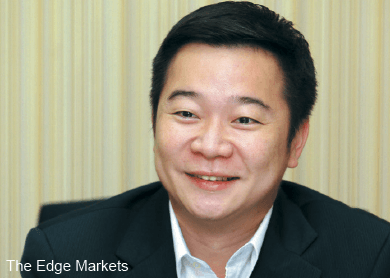
 HEALTH supplement company BioAlpha Holdings Bhd, which is en route to a listing on the ACE Market on April 14, is notable for its ambitious growth plans. It has commenced on turning itself into a prominent industry player on multiple fronts, ranging from herb cultivation to securing new distribution arrangements in the Middle East.
HEALTH supplement company BioAlpha Holdings Bhd, which is en route to a listing on the ACE Market on April 14, is notable for its ambitious growth plans. It has commenced on turning itself into a prominent industry player on multiple fronts, ranging from herb cultivation to securing new distribution arrangements in the Middle East.
BioAlpha managing director William Hon tells The Edge that the group’s upcoming listing on Bursa Malaysia is a natural step in its multi-pronged strategy to move up the value chain.
“Listing will not only help us raise funds but also affirm our reputation. Clients in potential overseas markets, such as the US, EU and the Middle East, will be assured that we adhere to health and regulatory guidelines, which is especially important because our products are for human consumption.”
Despite a modest market capitalisation of about RM90 million after listing, the company is expected to benefit directly from the government’s plan to grow the local herbal supplement industry over the next few years.
According to the Ministry of Health, Malaysia’s health supplement industry is expected to grow from RM759.36 million this year to RM914.59 million by 2018.
BioAlpha certainly has the requisite expertise to ride the industry’s growth. Its board of directors comprises prominent industry heavyweights with vast experience garnered from government-linked companies and growth corporations. They include former Proton Holdings Bhd chief Syed Zainal Abidin Syed Mohd Tahir, former Ministry of International Trade and Industry secretary-general Tan Sri Abdul Rahman Mamat and Tan Sri Syed Jalaludin Syed Salim, who is the chairman of the Halal Industry Development Corporation.
It is also noteworthy that BioAlpha’s two primary backers — Malaysian Technology Development Corp (MTDC) and Perbadanan Nasional Bhd (PNS), which are ultimately owned by the Ministry of Finance — have no intention of disposing of their shares post-listing. Hon explains that they are in it for the long term and are banking on BioAlpha growing in tandem with the local herbal supplement industry.
“MTDC is known for investing in biotechnology or life science companies. It has been in BioAlpha since 2008 as a venture capitalist. PNS invested in 2013 as a pre-IPO investor and both investors have been instrumental in advising us on technology and business development,” he adds.
Since 2008, the company has been successful in locking in long-term growth initiatives that are directly backed by the federal and state governments. In 2011, a subsidiary of the company was appointed by the Ministry of Agriculture as an entry project point partner under the Economic Transformation Programme.
The primary target of the initiatives is to strengthen the effectiveness of locally made herbal supplements with a view of turning them into prescription drugs. Hon says the pre-clinical trials have been highly encouraging and that the clinical trials are set to begin next year.
In Johor, a joint venture was set up in 2011 between the company and state-owned Johor Biotech & Diversity Corp for the cultivation of herbal plants on 295 acres in Desaru. More recently, another BioAlpha subsidiary was appointed by the East Coast Economic Region Development Council for the same purpose on 123 acres in Pasir Raja, Terengganu.
While Hon stopped short of saying BioAlpha’s backers helped secure these agreements, he says the symbiotic relationship between the company and its major shareholders will open up similar growth avenues in the immediate future.
In the meantime, BioAlpha is set to benefit from new revenue drivers. According to Hon, the group is on track to enter the Middle East market in the second quarter of this year via a collaboration with Fathima Group of Companies — a retail chain in the United Arab Emirates. Its health supplements have been screened by the UAE’s health regulators and awaiting final clearance.
Apart from manufacturing health supplements for multinational clients, BioAlpha’s other big push comes from establishing its own brands, such as Apotec, Nushine, and Alphahealth. Apart from selling these products in established pharmacy chains, the company is venturing into operating its own retail outlets and is eyeing up to 10 locations in the Klang Valley.
Note that the startup cost of about RM750,000 for each new outlet will be borne by cooperative licensees of MyAngkasa, a subsidiary of the National Cooperative Organisation of Malaysia. In this collaboration, BioAlpha is also hoping to promote its products to MyAngkasa’s eight million members at some point in the future.
“Some 10,000 cooperatives in Malaysia are advised by MyAngkasa. The members represent a huge market for us, which some of our competitors do not have access to,” Hon points out.
The various collaborations and joint-venture agreements have gone a long way in helping BioAlpha reduce its costs, thus boosting its profit margins. Revenue has grown at a compound annual growth rate of 30% over the past three financial years (FY2011 to FY2013) while the profit margin has averaged 33%.
Hon attributes BioAlpha’s healthy profit margin to it being in charge of the entire production process by virtue of being an original design manufacturer.
“As an ODM, our business is highly integrated. We have control over the raw materials, which can be used for our products or sold to other manufacturers. We also develop our own formulations, so there are no royalty costs. These factors all contributed to bringing down our cost of sales,” he says.
This article first appeared in The Edge Malaysia Weekly, on April 6 - 12, 2015.
Save by subscribing to us for your print and/or digital copy.
P/S: The Edge is also available on Apple's AppStore and Androids' Google Play.